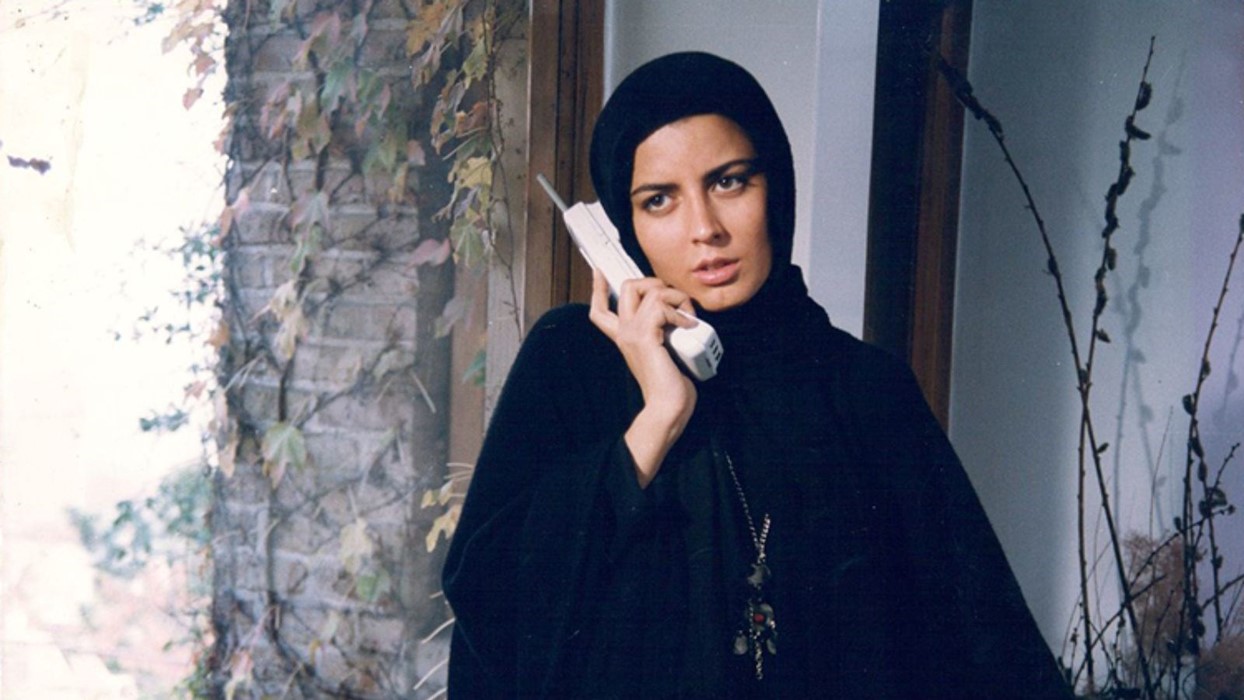
On Dariush Mehrjui’s “Leila”
On the occasion of Iranian filmmaker Dariush Mehrjui’s birthday anniversary, we invited writer and filmmaker Samina Saifee to reflect on his legacy with a focus on the 1997 film Leila, which depicts a marriage troubled by infertility.
Leila (Leila Hatami), the eponymous central character in Dariush Mehrjui’s film, is a soft-hearted woman deeply in love with her husband, Reza (Ali Mosaffa). When Leila finds out she cannot give birth, Reza’s unrelenting mother suggests that he take a second wife who can bear him a child. And thus Leila and Reza are thrust into a years-long series of torturous fights with each other and Reza’s mother.
Mehrjui approaches this story with the delicate intimacy of great literature. Despite how often they speak and fight, Reza and Leila are unable to assure one another of their love. After a particularly emotional conversation with her mother-in-law, Leila concedes and insists Reza begin meeting other women and arranging for a second wife so they can have a child. He begrudgingly agrees.
At first, this new chapter brings the couple closer. After his dates, Reza and Leila giggle all the way home like school children. But as it drags on and Reza’s mother calls her incessantly to relay the details of the next woman Reza is set to meet, and the next one, and the next one, this new reality grows teeth. It’s a dizzying second act, as Reza continues to meet women despite claiming he doesn’t need a child, as Leila is unable to believe Reza, as Reza’s mother continuously guilts Leila, and as Reza refuses to stand up to his mother.
Leila’s world, once filled with light and happiness, is quickly shrouded in darkness as she grows further and further away from her true self, even isolating from her side of the family who remain blissfully unaware of what is happening. The film even gives a physicality to this darkness, as we often see the space around Leila fading into endless black as she calls out to God, the smallest bit of light occasionally entering her world as if desperately escaping through a small crevice. The light shifts red during moments when Leila realizes what may be coming, underscoring her inner turmoil. We are with her in her loneliness, the film bearing witness to it throughout.
It is the cyclical nature of every conversation that makes this film so fascinating. It is impossible not to be utterly frustrated by these characters, and though we hear Leila’s internal monologue, her husband Reza’s mind remains impenetrable. Does he actually believe Leila wants this, despite seeing how sad she has become? Does he secretly want a child of his own and can’t say the words? Or is he simply unable to refuse his mother who started it all?
Leila follows in the footsteps of a series of Mehrjui films that focus on the female perspective; The Lady (1992), Sara (1993), and Para (1995). These films were met with less international acclaim, largely because they did not purvey the fantasy of foreignness that audiences expected from Iranian cinema. In his tribute, Godfrey Cheshire wrote: “Mehrjui deals regularly, knowingly, and provocatively with Iran’s middle and upper-middle classes. His characters drive BMWs, wear chadors that are distinctly chic, and argue (endlessly) over art, religion, divorce settlements, and real-estate deals. At a time when ‘Iranian cinema’ internationally connotes a certain distanced exoticism, views of rug-weaving nomads or impoverished children against crumbling walls, Mehrjui’s sleek, educated, post-modern Tehran is clearly anomalous.”
In short, not only did Mehrjui launch the career of Leila Hatami who later starred in Asghar Farhadi’s Academy-Award-winning film A Separation and Alireza Raisian’s Deserted Station (also on OVID); he also helped shift the trajectory of Iranian stories, lifting them out from under a Western gaze and into the very real domestic realities of Iranian citizens.
“God didn’t give me children. Instead, he has given me endless patience and endurance,” Leila says. As though what she is allowing is a selfless act when really, it is tragically self-destructive, so deeply rooted in insecurity and cruel to oneself that it cannot possibly come from a place of patience or love. But Mehrjui’s storytelling prowess balances our frustration with a profound sense of empathy for Leila. Deeply saddened that her body cannot do what she desperately wants it to do, she remains unable to believe that she is enough for her husband. And though she is at the center of her marriage unraveling, she believes herself to be watching from the sidelines of fate.
Samina Saifee is a filmmaker and writer based in Brooklyn. She is a graduate of New York University’s Tisch School of the Arts, and her work has been supported by Sundance, Film Independent, and The Orchard Project. Her first short film, AMERIGIRL, is on NoBudge and her first feature, an expansion of her short, is currently in development.

Leave a Reply